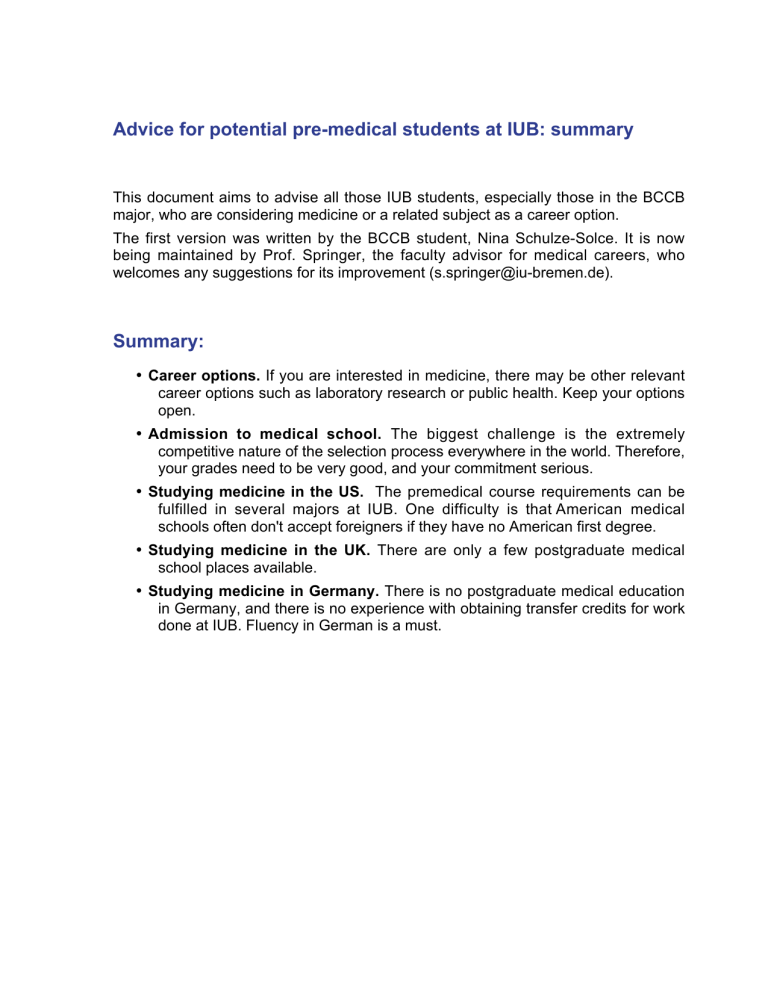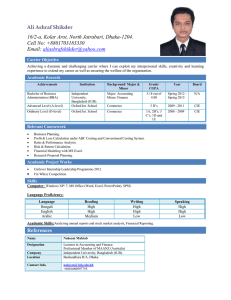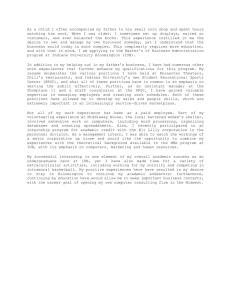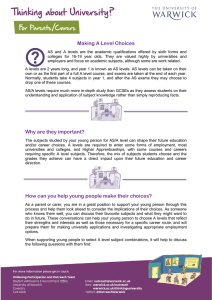
Advice for potential pre-medical students at IUB: summary This document aims to advise all those IUB students, especially those in the BCCB major, who are considering medicine or a related subject as a career option. The first version was written by the BCCB student, Nina Schulze-Solce. It is now being maintained by Prof. Springer, the faculty advisor for medical careers, who welcomes any suggestions for its improvement (s.springer@iu-bremen.de). Summary: • Career options. If you are interested in medicine, there may be other relevant career options such as laboratory research or public health. Keep your options open. • Admission to medical school. The biggest challenge is the extremely competitive nature of the selection process everywhere in the world. Therefore, your grades need to be very good, and your commitment serious. • Studying medicine in the US. The premedical course requirements can be fulfilled in several majors at IUB. One difficulty is that American medical schools often don't accept foreigners if they have no American first degree. • Studying medicine in the UK. There are only a few postgraduate medical school places available. • Studying medicine in Germany. There is no postgraduate medical education in Germany, and there is no experience with obtaining transfer credits for work done at IUB. Fluency in German is a must. 1 Is Medicine the right choice for me? Becoming a doctor is a long and rocky road. But if you are motivated, show interest and are ready to work hard, then achieving a medical degree can be rewarding both intellectually and financially. A person with medical skills is sure to be at high demand to any industry in society. After having completed your medical education, there are numerous directions in which you can begin your life’s work. However, not everyone is fit for medicine and even though it may sound interesting to you, it could be that your real vocation is not medicine but one of the following medicine-related fields. For example: • Biomedical Research in the widest sense – from human physiology to cell biology and biochemistry. Biomedical researchers usually hold a PhD instead of (or sometimes in addition to) an MD, but this depends on the country. In the UK, for example, there are many doctors who spend most of their time in basic biomedical research. Thus, the route to biomedical research does not have to be via medicine but can equally well go via an MSc or a PhD in biochemistry, biology, or chemistry. The professors in the biological sciences at IUB can advise you on how to become a biomedical scientist. Biomedical scientists are usually employed in industry, state institutes, and at universities. • Master of Public Health. Masters of Public Health usually work as managers or policy makers in health-related fields in governments, hospitals, or universities. • Other health-related jobs include dentistry, pharmacy, chiropractics, athletic training, physical therapy, biomedical engineering, etc. 2 Studying Medicine in the United States of America 2.1 Picking a Medical School in the US In general, the process is like choosing any other undergraduate institution. The website of the American Association of Medical Colleges, which is a good site to consult, has some questions to ask yourself: • Do I prefer a small or large school? • Do I like a large class or a small class? • Am I interested in a career in research, in clinical practice or in academic medicine? While every school offers opportunities to prepare for careers in all areas, the variety of curricular experience varies from school to school. Try to select schools that best fit your career goals. • Which schools have a learning approach that emphasizes primary care, patient education, prevention, and preparation for community practice? What schools have a teaching approach that will work well for me? • What kind of financial resources will I need to attend medical school? What are the costs? • What types of financial aid are available at the schools I am considering? • Are the schools in a location that meets my needs? • Are the schools connected to a university or are they free-standing institutions? It is not only important to ask yourself questions, but also to ask the medical school you are considering questions about their curriculum, academic evaluation, the school’s facilities, the amount of student support, financial aid, student involvement at the school and residency programs. 2.2 A List of Medical Schools in the US There are over a 125 medical schools in the United States. Many of them are part of bigger universities, while some are independent institutions. On the following website, the universities are ordered by state (alphabetically) and all the necessary contact information is given: www.stanford.edu/group/spa/meds/mschools.html On this website, the universities are listed both alphabetically and geographically: http://www.aamc.org/meded/medschls/start.htm Universities in the United States are frequently ranked by magazines, journals, newspapers or other educational institutions based on criteria such as faculty to student ratio, research grants, and the quality of research, teaching, and facilities. US medical schools are also ranked annually. This can be helpful but make sure that you understand what the basis of the ranking process is. • Combined U.S. Medical School Rankings: • Rankings of research-oriented Medical Schools: www.stanford.edu/group/spa/meds/rank.html http://www.usnews.com/usnews/edu/grad/rankings/med/brief/mdrrank_b rief.php • Rankings of primary care-oriented Medical Schools: • Comparing Medical Schools by selected criteria: http://www.usnews.com/usnews/edu/grad/rankings/med/brief/mdprank_b rief.php http://www.usnews.com/usnews/edu/grad/tools/brief/med_compare_brief .php • Methodology – US Medical School rankings: http://www.usnews.com/usnews/edu/grad/rankings/about/03med_meth.h tm 2.3 Admissions Procedure to Medical Schools in the US Of the 125 accredited medical schools in the United States, 113 are members of the American Medical College Application Service (AMCAS).This means that you will only fill out one application form and send it along with your transcript to AMCAS. There, the service will check your application form and after verification, forward it to the schools you have applied to. For the few schools that are not members of AMCAS, you will need to contact them directly and send them your application materials personally. After the schools have received your applications, they will contact you and sometimes, even ask for additional information such as letters of recommendation. On the AMCAS homepage, you will find more details: http://www.aamc.org/students/amcas/start.htm Here are also some links to medical school admissions websites: www.aamc.org/meded/medschls/admissions.htm 2.3.1 Am I eligible? It is important to note that many American medical schools do not consider applicants who are not American citizens and/or who do not have a degree from an American university. Check with the institutions of your choice. IUB is not an American university but in individual cases it might be possible to persuade the institution you are applying to that IUB is, through its ties with Rice, equivalent to an American University. The people to talk to about this at IUB is the Office of Academic Affairs. 2.3.2 What do American Medical Schools look for? Dr. Andrew S. Douglas, Professor of Biomedical Engineering at Johns Hopkins University, gives the following summary: "Medical Schools in the USA accept students on the basis of four major areas: 1. Academic preparation: overall GPA, MCAT scores, BCMP GPA, academic major, reputation of university, choice of courses (rigor), etc... 2. Preparation for a career in medicine: clinical experience and understanding of a medical career. This would involve experiences such as shadowing physicians, working as an emergency technician, assisting in clinical research, etc... 3. Personal qualities: primarily, demonstrating commitment to assisting others through volunteer activities etc.; leadership in various organizations. 4. Qualities that distinguish the candidate. For example, special talents in music, performing arts, writing, athletics, etc... " 2.3.3 Which courses should you take while at IUB? Many (not all) American medical schools emphasize that students should have completed the following courses at their undergraduate institutions: • One year of general and inorganic chemistry with accompanying lab course (9 credits) • One year of organic chemistry with accompanying lab course (9 credits) • One year of Biology with accompanying lab course (9 credits) • One year of Physics with accompanying lab course (9 credits) • One year of Calculus or Statistics (6 credits) • One year of English (6 credits) At IUB, these requirements can currently be fulfilled in the majors Chemistry, Biology, and Biochemistry and Cell Biology. It may also be possible to fulfill these requirements in the Biochemical Engineering, Bioinformatics and Computational Biology, Physics and other majors. If you are planning to fulfill the American premedical course requirements at IUB you need to plan your curriculum from the first semester. To do this, you should see your advisor, the faculty of your Major program, or the faculty advisor for premedical students at the beginning of the first semester. A premedical curriculum for Biochemistry and Cell Biology students is given in the Course Selection Guide of the School of Engineering and Science. This may also be the case for other Major programs. In general, your GPA will need to be above an American 3.3 (IUB equivalent of 2.00) for you to have a reasonable chance of getting admitted. For many American medical schools (such as Harvard University, Johns Hopkins University, Columbia University) you have to have studied (and obtained a BSc or advanced degree) in the US or Canada before you can be admitted to the school. Make sure this does not apply to the institution of your choice, if you wish to attend there directly after your graduation from IUB. 2.3.4 The MCAT The MCAT or Medical College Assessment Test is a standardized, multiple choice test similar to the concept of the SAT and ACT in that it helps the medical schools in their admission decision process. The MCAT was designed to assess problem solving, critical thinking, and writing skills in addition to the students’ knowledge of science concepts and principles necessary for the study of medicine. You will be scored in each of the following areas: Verbal Reasoning, Physical Sciences, Writing Sample, and Biological Sciences. A detailed student manual with more information about the MCAT can be downloaded from: http://www.aamc.org/students/mcat/about/start.htm There are various organizations offering courses (mostly over the summer) to prepare for the MCAT. Some people find these courses useful, others have a mixed opinion. If you are interested in attending a course, you can look for them in the internet by searching for MCAT courses under Google or Yahoo! There are too many to list here. 2.3.5 Prior Medical Experience To obtain prior medical experience, it would be useful to have worked in a hospital or in another health-related institution, preferentially in a position that includes witnessing or possibly even administering care (not filing, faxing, or copying). A perfect opportunity for you to gain this experience is during your internship, which normally takes place the summer after your second year at IUB. 2.3.6 Components of the application 2.3.6.1 Application Essay American Medical Colleges like giving their potential students essays to write. In fact, they like it so much that many of them will ask you to write an essay about the reasons you want to study medicine and why you are best suited for their school. These essays are to be taken seriously. Much money is being made by companies, such as EssayEdge (http://essayedge.com/medical/), by editing applicants' entrance essays. It may be a good idea to read through a few successful ones in order to get an idea of style and content. 2.3.6.2 Letters of Recommendation These will generally be the last item on your list of things to complete for medical school admission. These are only needed if specifically required by the medical school you have applied for. There is some information on how to receive good letters from your professors at the Stanford pre-med site: http://www.stanford.edu/group/spa/admit/recom.html In general, for any letter of recommendation, see to it early so that two or three of your professors know you well and can accurately describe and comment on the standard of your academic work. It is wisest to let the professors know a head of time, as they will want to do a good job for you. 2.4 Financial Aid A medical education can be expensive depending upon where you decide to attend medical school. In the United States, medical schools at public universities may cost as much as $25,200 and at private universities as much as $28,800. However, there are many student loans and scholarships available in the US. Loans sponsored by the government include the Perkins, the subsidized and unsubsidized Stafford FFEL (Federal Family Education Loan), the subsidized and unsubsidized Ford FDSL (Federal Direct Student Loan), and the Health Education Assistance Loan (HEAL). Non-federal loans include that of the AAMC with offers MEDLOANS. More information is found on their website: http://www.aamc.org/students/medloans/start.htm Other information regarding the finance of medical school in the United States can be further researched at these websites: • http://www.aamc.org/students/considering/financial.htm Student loans and • http://www.iatp.md/eac/Contents/FIN_AID/Index.html Financial Aid for • http://www.finaid.org Information about scholarships, loans, and savings scholarships International Students from the US Government 3 Studying medicine in Europe - general considerations The study of medicine in Europe is quite a bit different than in the United States. In Europe, it is customary that students apply for the study of medicine directly after high-school. This eliminates the middle stage of acquiring a bachelor’s degree altogether. The study of medicine generally spreads over 5 to 6 years (10 to 12 semesters) where pre-medical school is included and usually takes up the first two years of the curriculum. Most universities in Germany, France or the United Kingdom have a Faculty of Medicine and are, therefore, always dependent schools belonging to a bigger institution. In Europe, universities are rarely ranked, with an exception of the UK, and thus, the choice of the university depends more on the size and the city rather than its academic performance. The UK, Germany, France, and Italy all have central application systems through which medical students apply to the medical schools of their choice. These are similar to the AMCAS system in the USA explained above. These application systems will be further explained below in the individual country sections. 3.1 Picking a Medical School in Europe This process is identical to looking for an institution in the United States or any other country world-wide. It is important that you feel comfortable at your school, so the location, country, city, climate, language, currency, etc… play important roles. Furthermore, you should read through the medical school’s curriculum and see if it takes the approach to medicine that you prefer. Generally, Europe is known for a more theoretical approach, while America seems to give more hands-on experience to its medical students. As mentioned before, schools in Europe are not often ranked, so the place you pick to study medicine can give you the best medical education, if that is what you make of it. The best way to learn more about a university is to find them on the internet, ask for them to send you a prospectus, get in contact with them via email and discuss the university with parents, friends, family and professors. 4 Studying medicine in the United Kingdom 4.1 A List of Medical Schools in the UK There are a total of 29 universities that offer medicine as a single subject: The University of Aberdeen The University of Birmingham Brighton and Sussex Medical School University of Bristol Cambridge University University of Dundee University of East Anglia The University of Edinburgh University of Glasgow Hull York Medical School Imperial College of Science, Technology and Medicine (University of London) Keele University King's College London (University of London) University of Leeds University of Leicester The University of Liverpool The University of Manchester University of Newcastle Upon Tyne The University of Nottingham Oxford University Peninsula Medical School Queen Mary (University of London) Queen's University Belfast The University of Sheffield University of Southampton University of St Andrews St George's Hospital Medical School (University of London) University College London (University of London) University of Wales College of Medicine The University of Warwick However, there are a total of 311 courses in medicine and its related fields offered at various universities around the country. Related fields would include but not be limited to Forensic Medicine, Medical Chemistry, Medical Electronics and Engineering, Biochemistry and Molecular Medicine, etc… All of these courses can be further researched on the UCAS website: http://www.ucas.ac.uk . 4.2 Admissions Procedure to Medical Schools in the UK All applications to medical schools for undergraduates in the UK will be administered by the University & Colleges Admissions Service (UCAS, www.ucas.ac.uk ) This means that you will only have to fill out one application form and once it has been approved by UCAS, it will automatically be forwarded to the universities entered on your form. A maximum of six universities may be entered on the form. UCAS application forms can be received year round either via the post or the internet. You can also apply electronically if you have Acrobat Reader on your computer. The cost for application amounts to 15 £. All application forms must be completed and sent in to UCAS no later than the middle of October (exact dates vary year to year) one year before planned entry. For more information: http://www.ucas.ac.uk/getting/index.html 4.2.1 What do Medical Schools look for? In the United Kingdom, the Council of Heads of Medical Schools and Deans of UK Faculties of Medicine came together in order to write a document, which defines the criteria and guidelines by which students interested in medicine are selected during the admissions process. This document consists of 9 guidelines and can be viewed in greater detail by visiting the link given below. A small excerpt of this document is provided here: “First among these is the recognition that patient care is the prime duty of a doctor. Honesty, integrity and an ability to recognise one's own limitations and those of others are central to the practice of medicine. In addition, medical students should be expected to have good communication and listening skills, an understanding of professional issues such as teamwork and respect for the contribution of other professions. Curiosity, creativity, initiative, flexibility, and leadership are all desirable characteristics for the aspiring doctor.” http://www.cam.ac.uk/cambuniv/undergrad/medvet/principles.html 4.2.2 Prior Academic Requirements Medical schools in the United Kingdom want to be sure that you are well-suited and well-prepared for the study of medicine. The list of requirements that is necessary to be completed prior to admission is very similar for all medical schools in the UK. Generally, they look for any combination of the courses listed below at A-level or higher level in the International Baccalaureate: • Biology • Chemistry • Physics • Mathematics Because you will have already completed a bachelor’s degree in a life science before attending medical school in the UK, you will have (or at least should have) completed all of the above requirements. 4.2.3 Prior Medical Experience Similar to what was already mentioned above, medical schools in the UK are eager to hear about any prior experience you may have gathered in the field of medicine. Again, your internship the summer after your second year at IUB is the perfect time to take advantage of this opportunity. 4.2.4 Personal Statement (as part of the application) A personal statement is very similar to the essays you will be asked to write if you have decided to apply to an American Medical School. Here, however, the statement is not university specific; instead, the same copy will be forwarded to all institutions you have applied to. In a personal statement, you are asked not only to mention the hands-on experience you might have had either as charity work or as shadowing a physician in a hospital but also to mention the other interests you enjoy outside of your academic environment. Talking about a recent sports competition or musical performance are just two examples. 4.3 Postgraduate Medical Education in the UK In the United Kingdom, it is rarely possible to transfer into medical school via a degree in a biological or life science. There are only a few universities that, if they have an excess number of places, will allow students to switch from their current degree to medicine. But since the demand for places in medicine is always high and the quota for foreign students for whom this transfer might be possible is limited to 6 places for the entire country, this option is not a very good one to take. However, in March 2000, the University of Warwick and the University of Leicester have joined together in founding a program, which offers the study of medicine to postgraduates with a biological degree. This means that with a completed degree you are able to begin on a four-year study of medicine. This opportunity is open to UK, EU, and international students. At website of the Leicester Warwick Medical School (LWMS; http://www.lwms.ac.uk/index.html ) you can see that a student coming from IUB with a biological degree qualifies for the four-year A101 course in medicine, which is held at Warwick. The prerequisites for this course are: • Cell Biology • Molecular Biology • Genetics • Biochemistry The application form for this course of study will be sent to LWMS through the UCAS system explained previously one year before desired entry. However, you will also need to fill out a Supplementary Application Form, which will be sent to the Warwick admissions office directly. Again, details about this extra form can be found on their website. Generally, there will also be an interview. The tuition fees for the LWMS are based on citizenship. UK and EU students may apply for public funding from several UK Research councils and international students have the possibility of attaining scholarships issued by the UK government. Like IUB, LWMS opened its doors in August of 2001. So far, it is the only postgraduate institution in the United Kingdom to offer medicine as a single subject. In the coming years, King’s College (part of the University of London) and Keele University plan on doing the same. 5 Studying medicine in Germany 5.1 Admissions Procedure to Medical Schools in Germany In Germany, there is also a central admissions system similar to AMCAS and UCAS. You apply to the medical school of your choice through the “Zentralstelle für die Vergabe von Studienplätzen” (ZVS). You will once again fill out a single form with your top three choices of medical schools in Germany. Along with your grades, you will send you application form to the ZVS before a certain due date (this date changes every year and you will have to visit the website for more information). Within a few weeks, the ZVS will notify you at which university you have received a place. Even if you are not a German resident and did not do the German “Abitur,” you can still apply through the ZVS. This is because IUB is a German recognized institution and therefore, upon acceptance to IUB, you now qualify as a German student. In order to be able to study medicine in Germany, your grade point average (GPA) needs to be above a certain level which depends on the year in which you apply, and your specific situation. For more information about the rules and the procedures of the ZVS, please visit the following website: http://www.zvs.de 5.1.1 Prior Academic Requirements and Prior Medical Experience German Universities will need no proof on paper concerning which courses you have taken prior to medical school or which medical experience you may have already had. If you are applying to begin as a first-year student, then a good, hard-working, interested, and curious student is all they are looking for. However, it is, of course, important to prepare yourself even if certain courses or practical experience play little or no role in the application procedure. Since you will most likely be applying to the US and UK as well, you will already have plenty of preparation by the time you have fulfilled these requirements let alone. 5.2 Obtaining transfer credits for courses taken at IUB In Germany it is possible,but not easy, to obtain transfer credits when beginning the study of medicine after the completion of a biological degree. If you are serious about studying medicine in Germany, you will need to talk to the Landesprüfungsamt in the state (if you are German) where you were born. You will need to provide them with your allgemeine Hochschulreife. Next, you will have to send in all the information necessary for them to decide in how far your courses at IUB are equivalent to the courses at German universities. They may or may not give you transfer credits for some of the courses you sat at IUB the past three years. If you are not German, then there is a possibility to work with the ZVS in achieving some transfer credits. On their website, there is information about foreign students coming to Germany to study. However, the chance of obtaining credits or getting accepted to a German university is largely dependent of your nationality, where you graduated from high-school, what other degrees you have completed, and what subject you plan on pursuing. 5.3 Private German Universities offering medical degrees You may want to take a closer look at the Universität Witten Herdecke. This is the only private university in Germany that offers the study of medicine. The Universität Witten Herdecke was founded in 1983. The Faculty of Medicine offers medicine, music therapy, pharmacy and nursing as its primary subjects. Next to medicine, the university also offers a graduate program in Biochemistry. The student body has circa 1070 members with 90 of them being international students. If you are interested in more facts and figures, visit Witten Herdecke’s website at: http://www.uni-wh.de/english/ Although the website can also be viewed in English, the language of instruction is German. Furthermore, the university is private and so it does not run its admissions process in accordance with the ZVS. If you are interested in applying, then you will need to download the application forms from their website and send them in with all necessary requirements one year prior to planned entry. Witten Herdecke is always looking for international students and so even if you don’t have the German Abitur, you should not be hindered from applying. What you will need, however, is proof that you speak the German language. Other requirements include: • A handwritten and printed version of your resume (civil record) • At least two months of practical experience during time of application • Proof of completion of prior degrees (this is your Bachelor from IUB) • Application form (found on website) Witten Herdecke’s Homepage: http://www.uni-wh.de/ 6 Studying Medicine in Australia Information on medical studies in Australia can be found on following websites: • http://www.acer.edu.au/unitest/index.html . This website offers general information of graduate entry into medical schools in Australia. It also includes a link to the webpage of the GAMSAT test which must be taken by all students wishing to enter an Australian medical school. • http://www.acer.edu.au/unitest/gradentrymedd/documents/GMACguide03.pdfT his pdf file is a general graduate admissions guide for medical students. Four universities are mentioned in particular. • http://www.meddent.uwa.edu.au/prospect/etc/subview.cfm/SectionID/3/PageI D/26/SubpageID/55. In addition to the four universities mentioned in the previous link, the University of Western Australia also offers postgraduate degrees in Medicine and Dentistry. • http://www.gradschools.com/listings/menus/md_menu.html . This site offers more information on graduate medical schools in general. • http://gmp.steinerfamily.com/ . This is a very interesting private site with lots of information on Australian medical schools 7 Closing Remarks We hope that after having read this document, that some, if not all, of your questions regarding a medical education post-IUB have been answered. Many times the links provide even more detailed information than supplied here and often have direct contact numbers of professional institutions that are at your service regarding these matters. However, it is important to remember that the United States, the United Kingdom, and Germany are not the only places where a medical education is possible for you. Other countries that are worth investigating through the internet are Canada, New Zealand and South Africa. Any information that you may find and would like to share with others via this document can be submitted to Prof. Springer.



